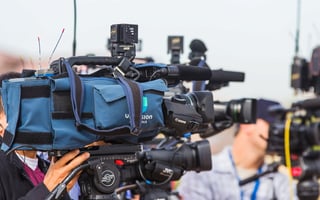Pitching isn’t easy, is it?
Artificial Intelligence is already having a huge impact on the media landscape.
Did you know we have already seen an edition of a newspaper created entirely by AI?
Or that AI news presenters are no longer a thing of the future and can even be found on UK radio?
In other parts of the media, AI is being used more subtly.
Regional publishing giant Newsquest now employs 36 AI-assisted journalists. The reporters use an AI-powered CMS to rewrite press releases into stories and are tasked with checking the facts and quotes are correct in the output.
The publisher says this “frees up the rest of the newsroom to actually be out pounding the beat, knocking on doors, getting original content that people are willing to pay for”.
We’ll be looking at how AI is changing the media landscape in more depth – and what it means for comms and PR professionals during our complimentary webinar later this month.
And, of course, our new AI-powered training companion – Thirty Seven – is already helping people refresh their media training skills and knowledge and prepare for their next media appearance.
But we want to shine a light on an aspect of AI that has been getting plenty of recent attention – and is even seeing some headlines being removed.
It is the rise of AI-powered ‘media experts’.
An investigation by Press Gazette has shown that some widely-quoted media experts are not who they appear to be.
The publication says that since the launch of ChatGPT, “anyone can generate comment, on any subject, in an instant.”
And it adds: “It is a technology that appears to have fuelled a rise in expert commentators who have appeared widely in national newspapers but who are either not real, not what they seem to be or at the very least have CVs which do not justify their wide exposure in major newsbrands.”
Press Gazette suggests these fake experts have come from using journalist-requests service sites and reporters sending comment requests on social media. Getting quoted and potentially having a website link included in a story from a credible news source can boost search engine rankings.
Worryingly, Press Gazette has compiled a dossier of more than 100 articles across the Mail Online, The Sun, Mirror, Express, HuffPost UK, Yahoo News, Metro, The Independent and the Telegraph based partly, or entirely, on input from apparently fake experts.
Since the investigation was published at the start of this month, publishers Reach, News UK and Yahoo have removed stories from their archives.
A spokesperson for Reach said: “Our journalists trust that third-party databases, PR agencies and brands check and verify their voices before they are featured in press releases or expert listings.
“It is clear that in this example, those checks have fallen short and we will be seeking assurances from external providers that this will not be repeated.”
News UK, Reach and Yahoo News have removed and amended dozens of stories after a Press Gazette investigation into fake experts being quoted in national media as part of a wide-ranging SEO fraud https://t.co/YCQzPa23ZS
— Press Gazette (@pressgazette) April 11, 2025
The rise of fake experts is a big issue for publications.
Apart from anything else, it is a breach of the Editor’s code.
A spokesperson, for the regulator IPSO, said: “Clause 1 of the Editors’ Code does require publications to ensure that care is taken to ensure accuracy.
“Publishers should be alert to this new challenge and the potential of artificial intelligence to spread misinformation and have systems or policies in place to manage the risk.
“We are monitoring concerns and standards issues in relation to the use of AI.”
But quoting fake experts also helps fuel the narrative – peddled by the likes of Elon Musk – that mainstream media cannot be trusted.
The 2025 Edelman Trust Barometer lists the UK as one of 14 countries where the media is “distrusted”. Globally, 63 per cent of respondents to that survey reported it is becoming harder to tell if news is from respected media or an individual trying to deceive people.
So, what could this mean for you and your hopes of being quoted in the media?
Well, we’ve already seen news publishers respond to the investigation.
And it seems there will be some ramifications for PR and comms pros, with a renewed focus on proving the authenticity and credibility of spokespeople and experts.
In more simple terms, it means you are more likely to be asked to prove your experts are not AI bots.
Verification might include needing to supply more detailed background information alongside any quotes and comments you provide.
You may need to include links to their social media accounts so identities and credentials can be checked.
And there may also be more requests for headshots.
There may also be a boom in telephone interviews. Instead of relying on supplied quotes sent through email, journalists may request to speak to your experts instead.
A quick telephone interview – something our media training can help you prepare for - could provide the necessary assurance that an expert is the real deal. It is much harder to fake expertise when faced with probing questions from journalists.
Additionally, we may see a focus on quality over quantity. During our media training courses, we have always stressed the importance of spokespeople and experts contributing in a way that helps journalists move the story forward and adds to the audience’s understanding rather than repeating what is already known.
In short, old fashioned news values and skills could play an increasingly crucial role in the modern AI news world.
Media First are media and communications training specialists with nearly 40 years of experience. We have a team of trainers, each with decades of experience working as journalists, presenters, communications coaches and media trainers.
Click here to find out more about our media training.
Subscribe here to be among the first to receive our blogs.




